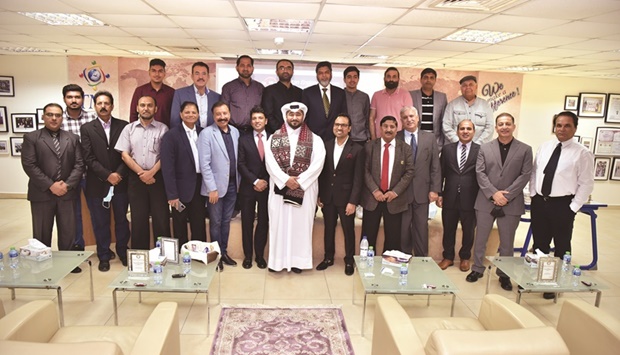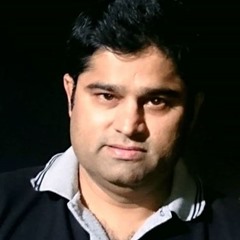Pakistan Engineers Forum (PEF) organised an engaging leadership seminar at the TNG School Al Wakra campus this week with the keynote speaker and international award-winning leadership coach Qaiser Abbas.
A business psychologist, who is also an international bestselling author, Qaiser shot to fame with his seminal work Tick Tick Dollar. He is also the recipient of the Brian Tracy International Excellence Award 2017.
Predictably, Qaiser stole the show, with personable and engaging interaction with his audience. He drew generously from his own inspirational success story to make the point that if he could overcome the odds and achieve what he has, anyone could.
Born into poverty, Qaiser recalled his difficult childhood and the accompanying tribulations. “I was a loner in a class of 59 at school, unable to meet anyone in the eye or give out an introduction as simple as spelling out my name. In a family of eight siblings, I was the youngest. To be frank, we weren’t assured the next meal. All this devastated my self-confidence. I couldn't speak for lack of confidence even though I topped the grades every year. My parents promised to buy me a bike every year, but they could never fulfil their promise.”
Qaiser is an author of 10 books, bestsellers amongst these. Being recognised by his peers is one thing, but life coaches and bestselling authors he looks up to, also speak highly of his prowess.
“Qaiser is the future of motivational speaking. He is an inspiration to millions around the globe,” observes Brian Tracy, the world's most respected authority on personal development. Dave Ulrich, the world's premier management guru and influential HR Thought Leader, on the other hand, endorses Qaiser’s credentials thus: “Your personal story is very impressive. You have clearly lived the purpose, passion, performance logic you write about.”
But it was far from a cake walk.
“Back then, even after I had grown up, I had to serve time in the canteens of newspaper offices of Jang Group, Pakistan's biggest media house, to make a living when in fact, I had gone to seek an opportunity to write. But today, I write bestsellers, of which my latest, Made in Crisis has been nominated for the ‘Business Book of The Year’ award,” Qaiser noted with pride.
How does he see himself, then?
“I consider myself an artist. Every day, I stand in front of my audience and start afresh. But it involves hard work. This is my 100th session on Tick Tick Dollar (a programme I created) and I still have sleepless nights! I believe in preparation. And how I work keeps evolving.”
Explaining Tick Tick Dollar, he jokingly said it should not be confused with money just because the title suggests so, and that, it is a life philosophy.
“My work has taken me to some 40 countries and everywhere, people come back to me and say how Tick Tick Dollar changed their lives. The pivot of this philosophy is finding a purpose. The first tick of the clock is to remind yourself to live your life on a purpose. The second tick is to live your passion. I encounter so many people who do not even know what their passion is — or, simply put, what their job entails is different from their passion.”
Qaiser felt a lot of people confuse goal with a purpose or use them as interchangeable descriptions.
“There is a marked difference. A goal is something you seek and are driven to get on a personal scale. Purpose and goal are, a bit like, give and take: the former involves giving, and the latter taking. For instance, when you focus on a goal, achieving it gives you joy, but it is temporary. However, when you focus on a purpose, this joy is long lasting. There is an outright distinction between the two: for a goal, there is a starting point and an end. With purpose, there is a starting point, but no finishing line. You can accomplish a goal, but you can never accomplish a purpose. Simply put, a purpose is not limited to yourself; even future generations may benefit from it,” Qaiser said, in a matter-of-factly mien.
“Have you thought about your life's calling,” he, then, asked the audience.
“During the course of my work, I get to meet a lot of successful people — some in their 50s, 60s and even 70s and they tell me they don't know what the purpose of their lives is! I appreciate their honesty, but it seems they were so busy making a living, they forgot or just didn't understand what that purpose was!”
Qaiser, then suggested a more meaningful way to look at finding a purpose in life.
“What is that one thing in your life that you can give up for it? How would you like to be remembered after you're gone? What role are you playing to make this world a better place than you found it? Once you begin to focus on these questions, you automatically begin to focus on the purpose of your life. I have a metaphor for it — I call it a compass — because the compass gives you (a sense of) direction. You just have to dig deeper.”
So how does one pursue the purpose of life?
“The answer is passion. It is the second tick. Purpose is where you want to go and why; passion is your vehicle to it. My metaphor for passion is heart. You need to connect with your heart here.”
And how do you make purpose and passion work?
“Commitment. It is what enables you to go the whole distance. But nothing substantial is achieved without getting out of your comfort zone. You should be willing to take risks to accomplish your goals and respond to the purpose in your life. Finally, it's about stretching yourself — going the extra mile to achieve the ends. And that's why, coming back to business, you will note that determined entrepreneurs persist with new ideas and strategies against the run of play, because they believe in themselves and those ideas, and more importantly, are willing to take risks to make these successful,” Qaiser drove home.
Talking of purpose, he looked at the audience and also underpinned the aftermath of success: “When you have found your calling, and if and when money starts to follow you, it's important not to be distracted and lose sight of that purpose. Never forget what made you and where you go with it.”
Giving an insight into his area of expertise, the renowned leadership coach said, trust and rapport is fundamental to help the CEOs achieve their professional objectives. “These people, at the top, are very lonely. Often, they don't really have someone to share their story with, particularly with regard to insecurities and concerns. If they did that with the board (of governors), they might even get dismissed, and if they did with their colleagues, they might come across as 'weak' leaders.”
How do the CEOs view Qaiser as a leadership coach?
“Once the CEO of a major league company told me: ‘Qaiser, you are like a mirror to us’. Yes, I do think my job is to show them a mirror. My job is to make them focus, not be distracted. The qualities of an effective coach is to earn the trust of their clients, respect them and develop a rapport in order to achieve the desired objectives.”
So how far has Qaiser traversed on this journey?
“I have trained more than 200 coaches, who are now working across four continents. I have also had the opportunity to work with Pakistan’s national cricket team multiple times and coached all 24 coaches involved in the national set-up. During my work, I have so far coached top-of-the-line business professionals from 55 different industries.”
But despite leading a tiresome life, he never loses his passion for what he does. “I do a lot of research and write every day to keep abreast of the developments. In fact, the first thing I do when I wake up and go to bed is write. So far I have written 10 books.”
Talking about his works, Qaiser said, the cheapest comes at US$35. And what does he do with all the money?
“You'll be happy to know that my entire earnings from books go towards the education of underprivileged kids across Pakistan. I also have a foundation called Possibilities, a programme under which underprivileged children to get to study in a school of their choice for which my foundation pays. There's yet another programme entitled 'My First Bike' through which we give out bikes to under-privileged children,” he said.
Asked by a member of the audience if he himself had coaches, Qaiser pointed out that he believed in coaching and would encourage CEOs to invest significantly into it.
“Since I believe in coaching, and it is every bit worth, I have not one, but three coaches for myself, too. Suppose you sit with a CEO for an hour of conversation and get paid $10K. What does that arrangement imply? It implies that there is something significant to gain from the exercise. At the end of that talk, it will have the kind of impact and outcome that makes it worthwhile. I still have my first coach, Arif Nafees, by my side. He has been coaching me for 20 years. Every year, we sit together with a new agenda and we have teams. We have been able to accomplish many things together,” Qaiser noted.
The seminar was graced by Syed Mustafa Rabbani, Deputy Head of Mission at the Embassy of Pakistan in Qatar, and Nasser al-Maslamani, Director HR at Baladna, both of whom also spoke on the occasion. Fawad Rana, the Managing Director of QALCO, was also present. Members of the Pakistan Engineers Forum, led by its president Riyaz Ahmed Bakali, who is also the director of TNG schools and organised the event, along with a large number of Pakistani community members attended the event.
Community / Education
“Finding a purpose in life is pivotal” — Qaiser Abbas, acclaimed leadership coach, tells audience at PEF seminar

Guests of Honour Syed Mustafa Rabbani, Deputy Head of Mission at the Embassy of Pakistan in Qatar; Nasser al-Maslamani, Director HR at Baladna; Fawad Rana, QALCO managing director; Riyaz Ahmed Bakali, PEF president and Director TNG schools; and PEF luminaries and members in a group poser.

